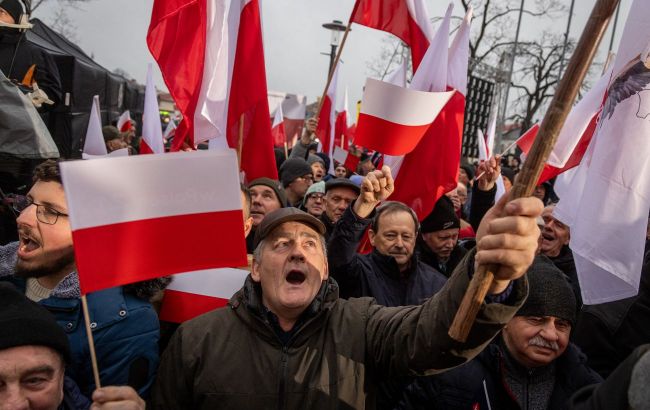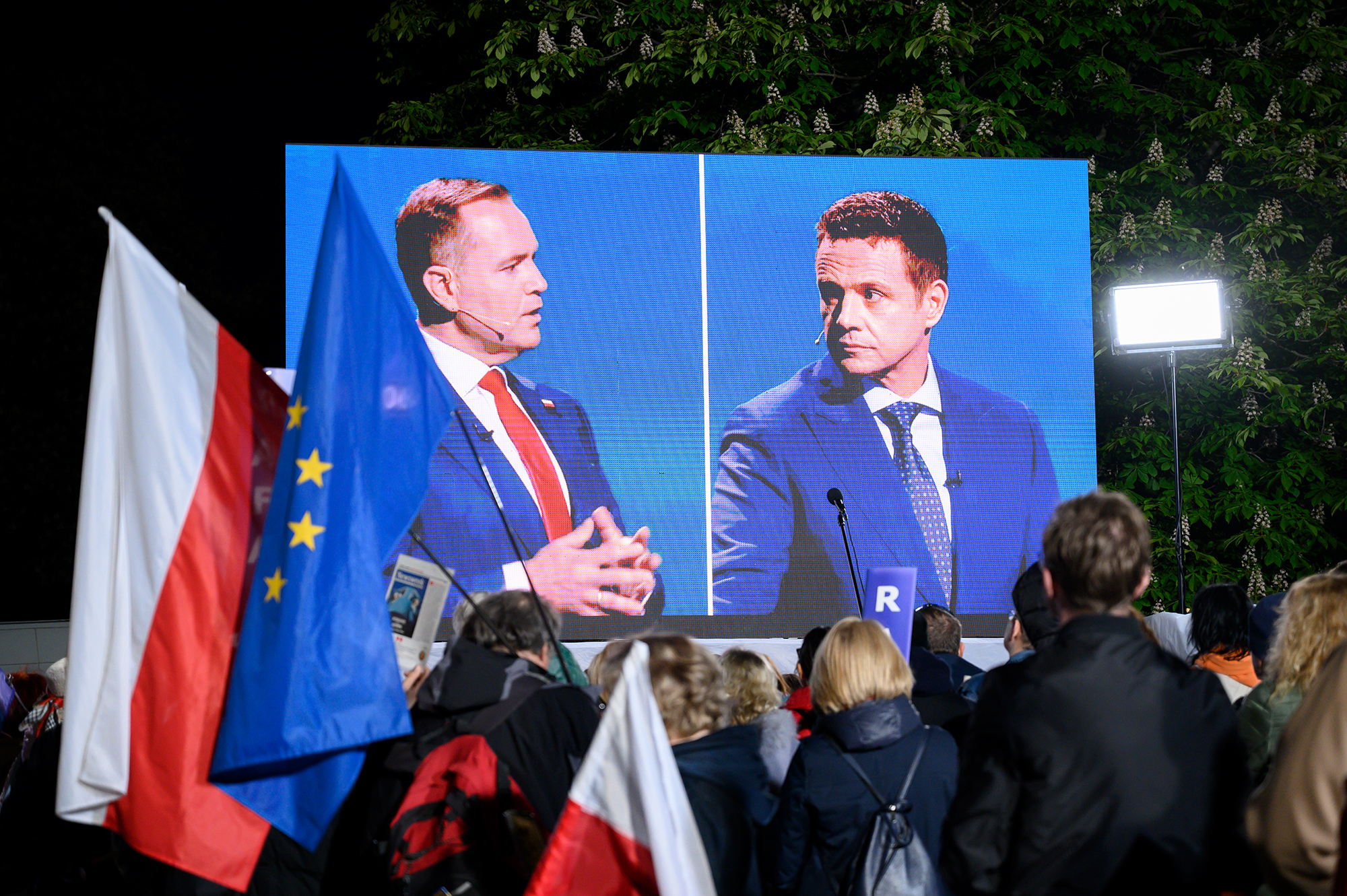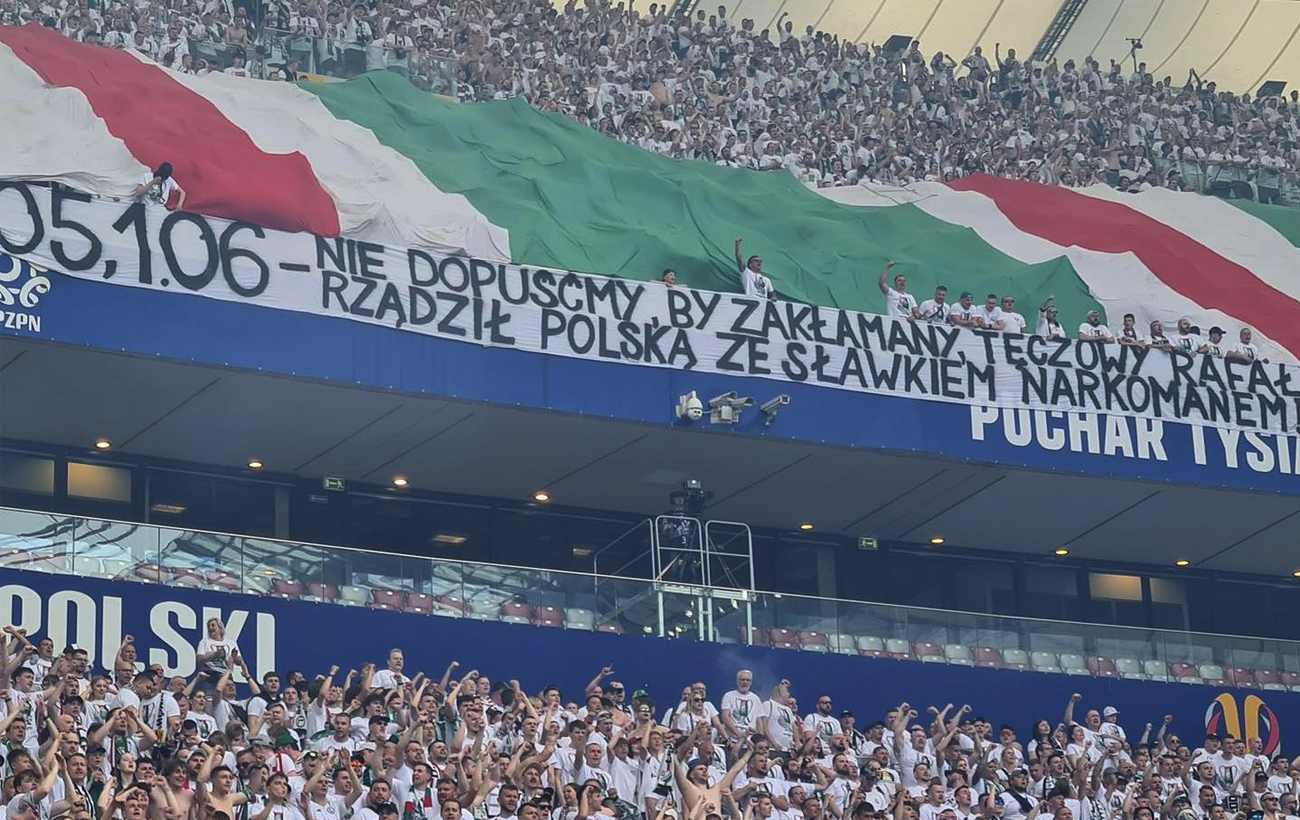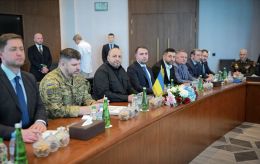Poland goes to polls. Who will become new president and how it may affect Ukraine
 Election rally in Poland (photo: Getty Images)
Election rally in Poland (photo: Getty Images)
This Sunday, May 18, presidential elections will be held in Poland, one of the most important European countries for Ukraine. Read RBC-Ukraine's article to find out who might replace the current president, Andrzej Duda, and what the key candidates' positions are on supporting Ukraine.
In addition to its hostile eastern and northern neighbors, Ukraine is facing more and more problems on its western borders. Openly pro-Russian Hungary and Slovakia are already creating problems wherever they can. Soon, Romania may be added to this list, where a pro-Russian radical has a chance to become president. Difficult parliamentary elections are also expected in Moldova.
Against this backdrop, Poland stands out, where presidential elections will also be held this Sunday. Although everything looks good for Ukraine at first glance, there are some dangerous nuances.
What is at stake in Polish elections
This year's presidential election in Poland is taking place in specific circumstances. Prime Minister Donald Tusk and his Civic Coalition, together with their partners, have a majority in parliament and have formed a government. However, they do not have full power, as the current president, Andrzej Duda, represents the opposition and can block parliamentary initiatives.
Equally important, the president is responsible for Poland's foreign and security policy.
At the same time, for the opposition Law and Justice party, which lost its parliamentary majority in 2023, the presidential election is a chance to take at least partial revenge and get the opportunity to further block the work of the Tusk government.
The choice of candidates in the elections is also related to these considerations. The Civic Coalition is represented by the popular mayor of Warsaw, Rafał Trzaskowski. Having led the Polish capital for several years, he can demonstrate success stories. Moreover, he almost became president in the last election, losing to Andrzej Duda by a very small margin.
In contrast, Law and Justice (PiS) supported an unlikely third-party candidate, the head of the Polish Institute of National Remembrance (INP), Karol Nawrocki. There were several reasons for this choice.
Firstly, to preserve the unity of the party, which is bursting at the seams. Second, his activities at the Institute are associated with the promotion of patriotic historical policy. The INP is a fairly influential institution in Poland, and Polish society has a consistently high interest in history. And thirdly, Nawrocki is less harmed by PiS's anti-rating, which arose during the party's long stay in power.
 Broadcast of the debate. Karol Nawrocki and Rafał Trzaskowski on the screen (photo: Getty Images)
Broadcast of the debate. Karol Nawrocki and Rafał Trzaskowski on the screen (photo: Getty Images)
According to an IBRiS poll for Polskie Radio 24 conducted on May 10-11, Trzaskowski received 31.5% of voter support. Nawrocki remains in second place with 23.6%.
These candidates are the clear favorites in the race, but other candidates are also worth mentioning. Even though they have no chance of winning, they have added drive to the campaign and sometimes directly influenced the positions of the two leaders.
According to the polls, the third position is occupied by the right-wing radical Sławomir Mentzen of the Confederation party with 12.6%. He is followed by the leader of the Poland 2050 party, Szymon Hołownia, with 8.6%, Magdalena Biejat of The Left with 6.3%, and Adrian Zandberg of the Razem party with 5.4%.
Unsuccessful campaigns of favorites
Trzaskowski is approaching the election with a lower rating than he had before the campaign. His popularity has dropped by as much as 8%. This is mainly due to a series of image failures.
For example, on April 11, during a debate in the town of Konskie, his opponent, Nawrocki, took out a rainbow flag symbolizing the LGBT community and put it near Trzaskowski. The latter had no choice but to throw the flag away. This gesture was seen by critics as evidence of inconsistency. After all, Trzaskowski had previously publicly supported the protection of the rights of the LGBT community and even participated in the Equality Marches.
And in general, his performance at the debates can hardly be called successful. Trzaskowski found it difficult to keep the initiative and reacted more to the actions of other candidates.
On the other hand, some of the criticism was directed at the politician because of his liberal views and his work as mayor. Fans of the Legia Warszawa football club are particularly active here, regularly posting banners against him. One of the most striking was the inscription during the Polish Cup final: "18.05. We will not allow the lying rainbow Rafał to rule Poland with Slawek the drug addict" (Trzaskowski's associate Sławomir Nitras - ed.).
 "18.05. We will not allow the lying rainbow Rafał to rule Poland with Slawek the drug addict" (photo: facebook.com/KonradBerkowiczPL)
"18.05. We will not allow the lying rainbow Rafał to rule Poland with Slawek the drug addict" (photo: facebook.com/KonradBerkowiczPL)
In addition, Trzaskowski's ratings are influenced by the successes and failures of the current government, with which he is associated. "Now we see that the support (for the coalition - ed.) is falling, because the population is not satisfied with the way reforms are being implemented, as interesting initiatives introduced by Law and Justice have been frozen. And a very specific policy is being pursued, in particular, in the context of the persecution of some PiS members, criminal cases are being opened. But in reality, people do not feel any changes,” Stanislav Zhelikhovskyi, PhD in Political Science, international expert, says in a commentary to RBC-Ukraine.
Even more scandals arose around Nawrocki, both serious and not-so-serious. At the beginning of the election campaign, a funny story surfaced about his attempt at self-promotion. In 2018, Nawrocki, under the pseudonym Tadeusz Batyr, wrote a book about the history of the Polish mafia. Later, it turned out that he appeared on television with a blurred face and altered voice, introducing himself as Batyr to praise his work published under his real name.
On TVP3 Gdansk, Batyr (Nawrocki) said: "There is a historian who inspired me to write the book. He was the first researcher to systematically study organized crime in Poland. This is Dr. Karol Nawrocki". This incident caused a flurry of ridicule and undermined Nawrocki's reputation as an honest candidate.
In January 2025, the politician was accused of illegally using the official apartments of the World War II Museum in Gdansk when he was its director. According to Polish media, the apartments were used not only for business meetings, as Nawrocki claimed, but also for his personal needs.
But it was another apartment scandal that did him the most damage. At the beginning of the campaign, Nawrocki claimed that he had only one apartment, and even mentioned it during the debates. But later, the Onet media outlet found out that he and his wife owned another apartment. The couple received it from a disabled pensioner in exchange for a promise to take care of him. As it turned out, the man lived in a nursing home, and his caretaker accused Nawrocki of lying and not paying utility bills.
All this did not have much effect on the core of Nawrocki's voters, the PiS supporters. The right-wing conservative media in Poland present these scandals as attempts by the authorities to defame the candidate. However, Nawrocki is having problems attracting undecided voters or those who support other candidates.
During the campaign, there was even a moment when he was almost overtaken by a third candidate, the right-wing radical Mentzen, known for his openly anti-European and anti-Ukrainian views.
Schedules for second round
It is already clear that none of the candidates will win a majority of votes in the first round, so all eyes are on the second round.
Trzaskowski's strategy in this context is based on opposition to Nawrocki and the mistakes of the previous government. However, he has changed the emphasis of his campaign several times.
"Trzaskowski would like to be more strong and more right-wing than before he was. So, the first stage of the strategy was focused on showing him like very strong politician, concentrating on defense, security issues. But nowadays he comes back to his roots, to the origins, and sometimes he is talking about more leftist issues like gender, like LGBT, like ecology, green matters, and so on," Warsaw University professor and political analyst Bartłomiej Biskup tells RBC-Ukraine.
According to him, it is most likely that Trzaskowski will receive votes from the centrist candidate Szymon Hołownia and, of course, from representatives of the left-wing camp: Magdalena Biejat and Adrian Zandberg. But he has problems attracting voters in small towns and villages. Accordingly, Trzaskowski switched to more constructive rhetoric.
"These candidates, Biejat and Hołownia, have quite big support, especially Biejat, and the support of Trzaskowski was decreasing to the level of Civic Platform, his political party. So that's why nowadays he is very friendly to them," Biskup tells the agency.
Instead, Nawrocki hopes for Mentzen's voters who hold right-wing and far-right views. He also emphasizes contacts with foreign politicians. In early May, Nawrocki managed to visit Donald Trump, and recently he was visited by far-right Romanian politician George Simion, who is also running for president in his country.
Although polls show that Trzaskowski has a better chance of winning in the second round, the situation may change, as there are still two weeks of active campaigning between the rounds.
"The main question nowadays in the campaign is how big will be the turnout, and how much of the voters from the first round will be voting in the second round. So especially from the Mentzen voters, especially from the Konfederacja, because "Konfederacja", this party has the youngest voters. So these voters are much unstable, and most of them don't want to go to the second round," Biskup says.
Ukrainian context
The current presidential race in Poland has been full of highlights and scandals. One of them occurred on April 30, when journalist (and presidential candidate) Krzysztof Stanowski interviewed a pro-Russian rival, candidate Maciej Maciak, who had said the day before that he admires Putin.
Stanowski's first question was whether he had heard correctly that Maciej admired the Russian president. The Putin supporter answered in the affirmative. After the answer, the journalist said that the program was over and left the studio. The conversation lasted only 57 seconds. Shortly afterward, Maciak left the studio, which was immediately demonstratively cleaned up after him without turning off the broadcast. This story shows the dominant attitude towards pro-Russian forces in Poland.
 Maciej Maciak alone in the studio after the disrupted interview (photo: Getty Images)
Maciej Maciak alone in the studio after the disrupted interview (photo: Getty Images)
On security issues, the main candidates had almost identical rhetoric toward Ukraine, Biskup said. Their position stems, in particular, from the mood in Polish society. And there is a clear understanding among the population that Russia will remain a threat to Poland for a long time. However, during the debate, Trzaskowski made an unexpected statement.
"Since I worked in the EU, in the European Parliament, I have clearly stated that Russia is a threat, and Ukraine should be a buffer zone," the politician said.
According to Zhelikhovskyi, such rhetoric may be related to Ukraine's upcoming accession to NATO. The presidential candidate could have made it, given that negotiations are underway to end the Russia-Ukraine war, where one of the US proposals is to suspend Ukraine's path to the alliance. But in general, Trzaskowski is one of the best options for Ukraine, the expert notes.
At the same time, Nawrocki supports a peaceful settlement of the war, but believes that the issue of territorial concessions should be resolved by the European community together with Ukraine.
But even at the Institute of National Memory, the politician declared the fight against the so-called Banderite ideology. He also repeatedly stated that Ukraine should recognize responsibility for the so-called genocide of Poles during the Volyn tragedy. Therefore, his presidency may mean a return to the practice when certain initiatives between Ukraine and Poland were blocked due to disagreements over historical events.
As for Ukrainians living in Poland, candidates also rely on polls. Here, too, the dynamics are disappointing, although the topic of Ukrainian refugees appears mainly in the context of negative attitudes toward migrants in general. Both Trzaskowski and Nawrocki are in favor of cutting social benefits. At the same time, more and more Ukrainians are obtaining Polish citizenship and becoming voters themselves. And their vote will be taken into account during the next campaigns.
In general, these elections have shown that Poland is still divided, primarily on the level of values. Therefore, the new president will face not only security challenges regarding Russia, Ukraine, and Europe. He will also need to somehow unite Polish society. If he fails to do so, the country will certainly face new political crises.
Sources: IBRiS survey, statements of Polish politicians, Onet, Rzeczpospolita, Gazeta Wyborcza, and comments by Stanislav Zhelikhovskyi and Bartłomiej Biskup.

